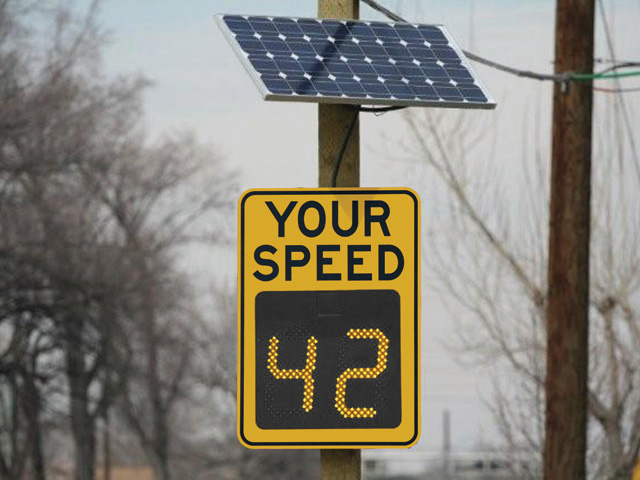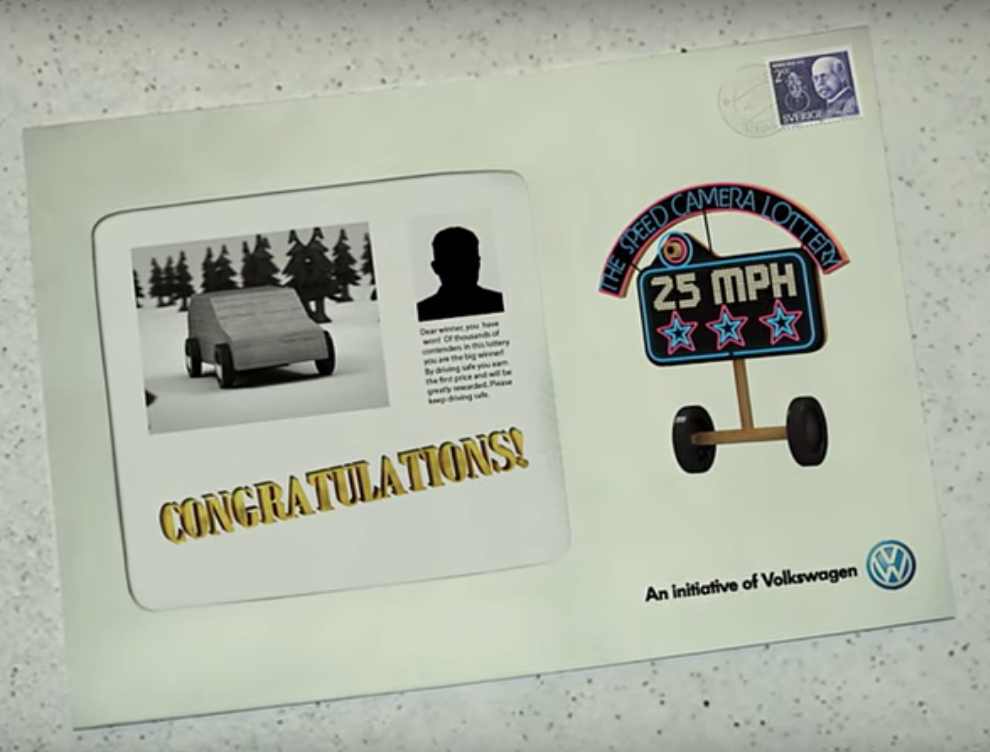Slow and Steady Wins the Lottery

If you’ve driven around enough, you’ve probably seen a sign like the one above. Called a “radar speed sign” in some places, a “Vehicle Activated Sign” in others (mostly in the UK), and various other names elsewhere, these signs serve a simple purpose: they hope to guilt you into slowing down. If you’re driving faster than the posted speed limit, the numbers often flash or turn red, in hopes of making you remove your foot from the accelerator.
According to a few studies, these signs work somewhat — here’s one such paper (pdf) if you’re interested. But guilting people into behaving, while often effective, isn’t very nice. And in 2009, Volkswagen decided to take the opposite approach: could we use fun to incentivize people to do the right thing? So the car company launched a project called “The Fun Theory” in hopes of finding ways to do just that.
A man named Kevin Richardson was one of the early winners. His idea was simple: turn traffic tickets into a lottery.
The radar speed signs, Richardson figured, could do more than detect speeders — they could also detect people who weren’t speeding. Add in a camera, and you had a way to identify law-abiding drivers and, by cross-referencing with a DMV database, send them something in the mail — money. Specifically, per the NewYork Times, “a portion of the subsequent fines levied against speeders would be pooled in a lottery, with a random winner periodically drawn from the group of speed-limit adherents.” Drive too fast, you might get a ticket. Drive more slowly, and you may get one of these:

Volkswagen liked the idea so much that, beyond naming Richardson a winner, they put his idea into action. In Stockholm in November of 2010, VW ran a three-day test of Richardson’s idea, except instead of repurposing traffic fines (VW can’t issue tickets or reallocate municipal funds), the car company used its own money to fund the lottery winnings. A PR and media campaign supported the initiative, telling Stockholm’s drivers about the new, pecuniary benefits of slowing down.
Over the three-day period, nearly 25,000 cars passed by the cameras, per a video showing the test in action. The average speed before the test was 32 km/hr (25 mph), a bit faster than the 30 km/hr speed limit. after, the average speed fell to 25 km/hr (15.5 mph) — and this was in spite of the fact that VW couldn’t actually levy fines. VW did, though, send out cash prizes in envelopes like the one above, with at least one person getting the equivalent of about $2,500, according to the Toronto Star.
Richardson’s hope was to “get people to obey the speed limit through fun” (as he says in that video), and it looks like it worked. But unfortunately, it looks like the fun is going to stop in Stockholm: we haven’t seen his speeding ticket lottery put into action anywhere beyond that test.
Bonus fact: Another Fun Theory finalist put into action was something called “The World’s Deepest Bin,” a garbage can outfitted with a sensor and speaker system. When a passerby dropped some trash in the can, a long sound played as if the garbage was falling a very, very long distance — well beyond the length of the can. As that project’s video shows (watch it here), people would pick up trash off the ground to get the sound to play. The can collected 72 kg (159 lb) compared to 41 kg (90 lb) deposited in a nearby, silent can on the day of the experiment. Unfortunately, the experiment didn’t account for people throwing away otherwise good stuff, so while the park may have been cleaner, the world at large may have been slightly worse off.
From the Archives: Life in the Fast Lane: Finland’s atypical speeding ticket system, which cares not only how fast you were going, but about how much money you make.
Take the Quiz: A speed geography quiz: You have three minutes to answer 50 questions. Go.
Related: If you want your own radar speed sign, you can buy one on Amazon. It’ll cost you nearly $4,000, but on the plus side, it comes with free shipping.
